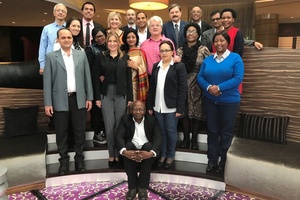BRICS TB Research Network to accelerate research and innovation through collaboration across the BRICS countries
Johannesburg, 29 June 2018 | The National Department of Health is hosting the third BRICS TB Research Network Meeting, over 28 – 29 June 2018, in Johannesburg with delegates from BRICS countries and the World Health Organization (WHO). The meeting is part of the multi-country vision to accelerate research and innovation in TB, through the BRICS cooperation mechanisms and is a preparatory meeting in advance of the forthcoming BRICS Ministers of Health meeting and the United Nations High-Level Meeting.
The BRICS TB Research Network is set against the backdrop of a
TB epidemic where, in 2016, there were an estimated 10.4 million
new TB cases globally, with BRICS accounting for 40% of the
global TB disease burden and mortality, and at least 50% of the
global multidrug-resistant TB cases.
Considering the
burden of tuberculosis in the BRICS countries and the research
capacity within these five countries, the BRICS TB Research
Network was established to develop robust research into new
tools, diagnostics, vaccines and drugs and to inform and
accelerate the best use of existing and new interventions in TB
control and prevention toward elimination. “We want BRICS
to take the lead in a process that will contribute to the
elimination of TB by investing in new diagnostics, vaccines, and
drugs as well as contributing to reducing the pill burden
through shortened treatment regimens,” says Ms Precious
Matsoso, Director General of Health, South Africa.
Investing
in health care innovation was also the message we highlighted at
the recent 5th SA TB Conference, held 12-15 June 2018, at Durban
ICC. The National Department of Health and SAMRC hosted
satellite sessions, showcasing our cutting-edge TB research and
developed an interactive exhibition that resonated with the
theme of the conference,
“Step Up, and Let’s Embrace All to End
TB!”
“The Network is an endeavour to collaborate
with BRICS Ministries of Health and scientists to address the
problems with TB in BRICS and to raise resources to find local
solutions,” says Prof Gray, President and CEO of the
SAMRC. “Collaborating on such platforms is how South
Africa can strengthen our efforts to end TB,” says Dr
Barry Kistnasamy. South Africa is expanding and strengthening
its existing research network in BRICS by developing
partnerships in BRICS who share a vision of ending TB.
“We
need to ensure that all those in need have access to existing
tools and novel financing mechanisms are created to accelerate
development of new diagnostics, therapeutics and vaccines. BRICS
countries have the capacity to foster global TB R&D,”
says Dr Matteo Zignol of WHO.
The Indian delegation
presented details of research collaborations with other BRICS
countries for TrueNAT test (molecular diagnostic tool developed
indigenously by India for diagnosis of TB), clinical trials for
indigenous TB drugs, potential candidates for TB vaccines and an
indigenous Tuberculin Skin Test for diagnosis of Latent TB
infection.
“This collaborative approach for
addressing the common challenges is a step in the right
direction. India is committed towards achieving the goal
of Ending TB along with the other BRICS countries by supporting
the BRICS TB Research Network," said Dr Srikanth Tripathy,
Director, National Institute for Research in Tuberculosis,
Chennai, India.
Russian TB experts suggest that
successful work of the BRICS TB Research Network is critically
important for improving the situation in our countries and
achievement of the End TB Strategy. The Framework of the Network
should provide an exchange of technologies and best practices
for TB control developed in BRICS countries.
Russian
experts and manufacturers have new technologies, diagnostics,
treatment practices for joint trials and validations. “We
believe that those tools can help to support and improve TB
control in all BRICS countries. At the same time we expect to
participate in joint research focused on development, trials,
validations and new technologies focused on specific tasks of TB
control in our countries, first of all cost effective and rapid
detection of XDR-TB and additional DR-TB detection among people
living with HIV/AIDS, as well as developing and testing short
regimens for M/XDR-TB,” says Vadim Testov, National
Research Medical Center of Phthisiopulmonology and Infection
Diseases, Russian Ministry of Health.
The Brazilian
delegation represented by Brazilian government officials and
researchers fully support the activities of the BRICS TB
Research Network. “BRICS countries have lots of actions in
the fight against tuberculosis and this Network will make it
feasible for joint research and development activities in areas
which overlap,” says Wanessa Tenório and Kleydson
Andrade, from Department of Transmissible Disease Surveillance,
Ministry of Health of Brazil.
Among the deliverables
of the current Meeting, the partners are looking to map the
tuberculosis scientific landscape among the BRICS countries and
generate collaborative research project proposals covering
diagnostics, vaccines, drugs, infection control for TB and
patient centered delivery and care.
The South African Medical Research Council:
The South African Medical Research Council (SAMRC) was
established in 1969 with a mandate to improve the health of the
country’s population, through research, development and
technology transfer, so that people can enjoy a better quality
of life. With a strategic objective to help strengthen the
health systems of the country – in line with that of the
Department of Health, the SAMRC constantly identifies the main
causes of death in South Africa (www.samrc.ac.za).
BRICS TB Research Network:
The BRICS TB
Research Network was launched in September 2017 as an outcome of
the BRICS TB Cooperation Plan approved in the 6th Health
Ministers Meeting in New Delhi, 2016, and supported by BRICS
Heads of States, as agreed in the Xiamen Declaration, 2017. The
Network’s key objectives include identifying scientific
research, development and innovation, fostering development of
new effective, safe and affordable preventative tools,
diagnostics and treatment regimens for all forms of TB, and
conducting multi-country TB studies.
Source:
SAMRC


